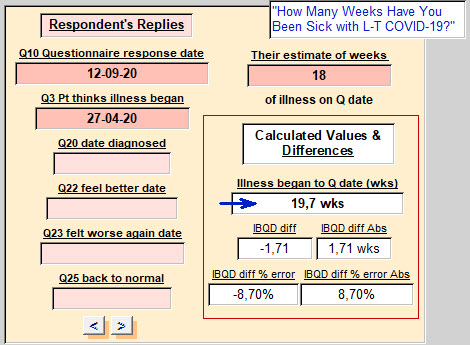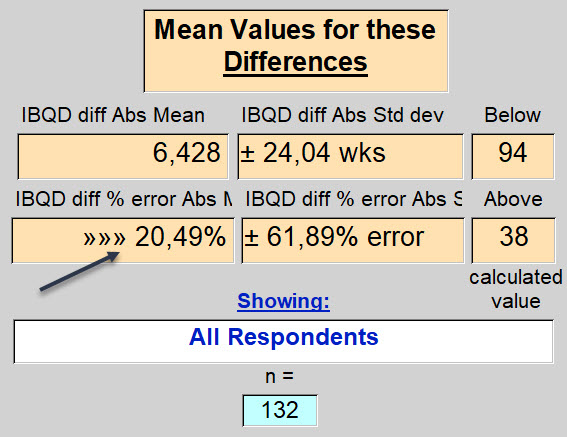Q. 24 - Respondent's estimate of number of weeks of illness
LTCOVID.com
Thanks for visiting!
To translate this page, select your
language from the dropdown menu below:
This too was thought before responses began to arrive, to be straight forwards.
Online, in support groups for "long-term" COVID-19, it was noticed that participants frequently referred to themselves, or asked others, how many weeks they had been ill.
Using the dates that respondents provided for when their illness began, and having the date when each responded to the questionnaire, calculating the interval in days and dividing by 7 provided an easy answer.
But when compared with the respondent's reply for number of weeks ill, the two did not always match.
In fact the provided answer was usually less than the calculated duration in weeks.
Here is an example of one such response : an 8.7% error.
One should not be too stringent I assume. People get in the habit of responding a number of weeks of illness without recalculating it each day.
But when all respondents' replies were taken together, it yielded this result below.
For the 132 responses, these were below the calculated value 94 times and above 38 times.
The mean percent error was 20.5%, or being off by 6.4 weeks when calculated with absolute values!
This was a surprise.
Without getting too far into this in this first look at results, some comparisons were interesting:
Women : 20.55% error between date provided and calculated date.
Men : 17.35% error " ".
Before getting into trouble, I add that this gender-related difference was not significant.
Those respondents Age <21 years had a % error of 91.39%
Age 61 to 74 years 9.54% error between the calculated and furnished response for weeks of illness.
This difference was statistically significant (two-tailed t = 2.6292, p = 0.0190.
Then again, one of the younger respondents answered "100 wks" from start of illness to questionnaire date. 2 years of COVID-19 is at this date improbable. Inattention?
One response in the older group was "300 wks." So here a reminder that even though the ability to find a "statistically significant difference" sounds impressive, it may at times represent 'garbage in and garbage out.' First reviewing the raw data furnished is essential.
No immediate explanation is evident. It seems perhaps a question of attention to detail.
I doubt it's intentional given the findings in the overall group sampled.
Most are below the actual calculated value.
For someone living an illness that seems to have already gone on too long, perhaps this is a subconscious method for reducing that duration.
Errors that were shorter than the actual calculated duration in weeks, appeared 2.5 times more often than those that were longer than the calculated value.
A recurrence of any illness is always disappointing.
Respondents who had felt better during their illness, then subsequently felt worse, had a mean error in their answer of weeks of illness of 37.28%. Those who had felt better, but then never felt worse subsequently, 14.90% error. But when challenged statistically, these differences were not significant.
It may remain an interesting but still unexplained observation that adds little to our understanding of "long-term" COVID-19.
<<<<<< Previous page
Q. 25 - Date when this illnes became a thing of the past >>>>>
A découvrir aussi
- Q.3 : Date illness began
- Q. 30 - A typical day at present includes ...
- Q. 41 - Involved 'Organ Systems' during this illness



